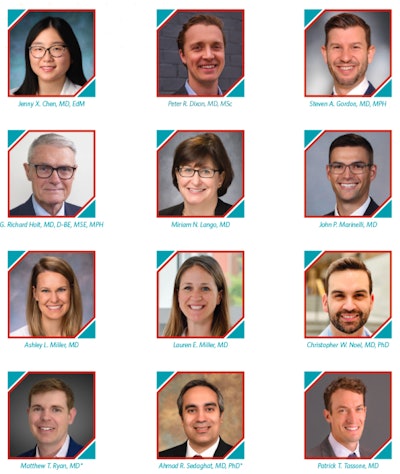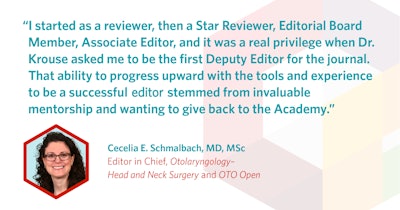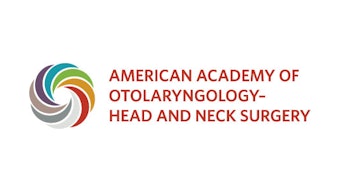Journal Star Reviewers Honored at #OTOMTG25 in Indianapolis
Thirteen exceptional individuals received Star Reviewer recognition at the AAO-HNSF 2025 Annual Meeting & OTO EXPO for their contributions to research in the specialty.
The following individuals were honored for their outstanding service to the journals over the last year:
 Not pictured: Taryn Davids, MD, MSc, FRCSC
Not pictured: Taryn Davids, MD, MSc, FRCSC
*Star Reviewer Emeriti have earned the title of star reviewer at least five times.
The 2025 Star Reviewers demonstrated three hallmarks of excellence: completing over 10 comprehensive reviews annually, consistently high-quality ratings and timely submission of their reviews.
Excellence in Peer Review as a Path to Leadership
Serving as a peer reviewer for the OTO Journals offers more than the immediate rewards of CME credit and staying current with research—it can be the first step on a pathway to editorial leadership. All of the journals’ leaders, including the Editor in Chief, began their journeys as reviewers and progressed by demonstrating their commitment through consistent, high-quality and timely reviews. Eligible Star Reviewers are invited to join the journals’ Editorial Board each year, and exceptional board members often rise to the position of Associate Editor.

Peer Review Is Vital to the Future of the Specialty
As the volume of research in otolaryngology continues to grow, the importance of rigorous peer review has never been more important. Reviewers serve as gatekeepers of scientific quality, ensuring that published research meets the highest standards for methodology, ethics, and clinical relevance. Their expertise helps distinguish meaningful contributions to the field and improve studies not yet ready for publication, ultimately strengthening the evidence base that guides clinical practice.
“There is a lot of research being done, but not all of it necessarily needs to be published. There should be a vetting process—which is peer review. Through this process, we, as clinicians, scientists, and academics, can benefit from the best research,” said Associate Editor for Case Reports, Chau T. Nguyen, MD. “There is pressure in academia in all parts of the world to produce research. But ultimately, we want to learn what is most relevant for our patients and the specialty when we open a journal. This is where the value of collaboration among authors, peer reviewers, and journal editors comes into focus.”
This quality control process has direct implications for patient care. Said Lee Akst, MD, former Associate Editor for Laryngology, “If we are going to take research findings and use them to advance patient care, we need to be able to trust in the quality of the papers that we are reading. Excellent peer review is crucial in helping this to happen. I don’t know how we can grow and evolve as a field without protecting the quality of the research that we share with one another.”
In recognition of the essential service peer reviewers provide to the specialty, the OTO Journals offer meaningful rewards and professional development opportunities for those who contribute their time and expertise.
Additional Benefits of Peer Reviewing for the OTO Journals include:
- AMA PRA Category 1 Credit™ for each eligible review
- Honor points for AAO-HNS members
- Eligibility for excellence awards for top reviewers that confer additional rewards, like waivers for Open Access publishing fees
- Staying current with cutting-edge research in your areas of interest
- Developing critical appraisal skills that enhance your own research
- Contributing to the advancement of the specialty
Interested in Becoming a Peer Reviewer?
The OTO Journals welcome applications from all eligible individuals. What does it take to become a peer reviewer?
- If you're currently a physician in training, you must have completed your residency and should have experience either solo reviewing or co-reviewing.
- If you're involved only in research and not aiming to practice medicine, you must have completed a PhD and/or have significant experience reviewing or co-reviewing.
- Retired physicians and those in military or private practice are welcome to review in areas in which they have expertise and have no conflicts of interest.
- Reviewers do not need to be current members of the Academy, though we encourage all eligible members to get involved!
Resident Reviewer Development Program: If you are a resident interested in learning how to peer review from an experienced mentor, the Resident Reviewer Development Program (RRDP) is a great way to get started. The RRDP application cycle is now closed for the 2025–2026 cohort but will open again soon for the 2026–2027 cycle. If you are interested in applying, please contact rrdp@entnet.org.
How to Apply: Submit your CV and complete a brief form highlighting your areas of expertise to the journals' Editorial Office at otomanager@entnet.org.
Read more about pearls for becoming a star reviewer from several of the 2024 Star Reviewers:
Behind the Peer Review: Conversations with Star Reviewers
Behind the Peer Review: A Conversation with Star Reviewer Patrick Tassone
Behind the Peer Review: Conversations with Star Reviewers
Behind the Peer Review: A Conversation with Marco Antonio Figueroa Morales, MD, MSc, MEdFor more information about how to get started, visit: Why Peer Review for the OTO Journals













